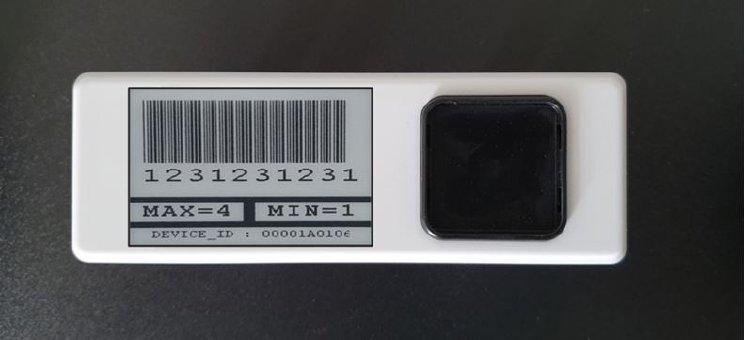Today, shelf spaces in assembly and logistics departments usually have a paper label on the loading and unloading sides. This includes at least the part number and usually also the part name and a 1D or 2D barcode of the number. Minimum and maximum quantities, space codes, etc. are specified as required.
Shelf labels need constant updating and monitoring. The labels have to be regularly replaced, e.g. if they are damaged, new part numbers are added, old part numbers expire or parts are relocated. This usually involves labels being printed, cut and put in place. Additionally, the plexiglass covers require regular maintenance, as they often suffer damage.
“Digital solutions involving e-ink tags that support remote updating are already being used in the retail sector, for example. However, these are generally expensive because they need a wireless network to edit the tags. The wireless network has to operate in the low-power range so that the batteries in the tags last for as long as possible without needing to be replaced. When e-ink tags are used in the production area, there is no guarantee that the tag will stay exactly where it should. Remote updates are therefore pretty much unrealistic”, explains André Ziemke, Managing Director of nextLAP GmbH.
Digital, lean shelf space labelling
nextLAP is a provider of AI-based solutions for the digital management and automation of production and logistics processes, and has now developed a new generation of e-ink tags. The tag doesn’t need a battery and can be edited on site with a mobile app via NFC, completely eliminating the need for current paper-based processes.
Labelling is carried out by placing the mobile phone on the tag. The employee is physically present at the shelf and can therefore immediately verify that the tag is correctly installed and positioned. No additional wireless network infrastructure is required to edit the tags. And because there’s no battery, there’s no need for battery changes or the related additional maintenance processes.
“Being able to eliminate maintenance processes is crucial, because in the automotive industry, for example, order picking in logistics is often carried out by external service providers, which requires additional maintenance processes to first be contractually agreed as well as additional costs,” explains André Ziemke. “We offer factories a simple, cost-effective solution that is both industry 4.0-ready and lean.”


